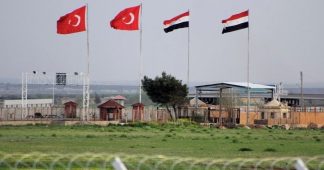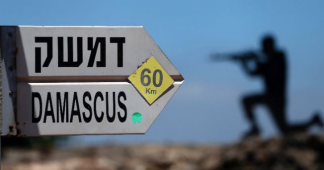By Maj. Danny Sjursen
Aug 22, 2019
Once upon a time, Hawaii Rep. Tulsi Gabbard traveled to Syria and met with the strongman President Bashar Assad. She considered her willingness to engage all sides of the country’s bloody civil war to be an important step toward peace. For this bold action, she was widely pilloried at the time and considered by some an authoritarian apologist or outright traitor. The claim was repeated again recently by the ever-so-mainstream California Sen. Kamala Harris, a fellow Democratic presidential hopeful. The attacks on Gabbard’s Syria record have been quite regular among Washington insiders, who considered the congresswoman foolish. But was she? More than two years later, given events in Syria, one must conclude that she certainly was not. Indeed, Gabbard was right all along.
Recently, Assad’s Syrian Arab Army (SAA) has squeezed the anti-regime rebels in their last major stronghold of Idlib, in the country’s northwest. Thus, the latest phase of Syria’s civil war is nearly over. And Assad, along with his Russian and Iranian backers, have won. Perhaps that’s not such a bad thing. Un-American blasphemy, right? Hardly.
For years, the West and its Gulf State theocratic partners decried the admittedly brutal Assad and sold their populations the fantasy that there were “moderate,” non-Islamist rebels. The reality is that the rebels were infused with, and quickly dominated by, various jihadist fighters from the very start. Yes, Assad is a veritable monster; but what of the Nusra Front (an al-Qaida franchise) and the even more extreme Islamic State—are they not equally deplorable, and, frankly, more of a transnational threat to the U.S.? Of course they are. Assad, at least, posed no serious threat to the United States (neither did his neighbor, Saddam Hussein, by the way) and both suppressed Sunni jihadism and protected Syria’s plethora of Christian, Allawi and other minority populations.
Yet, as journalist Max Blumenthal made clear in two illuminating chapters of his latest book, “The Management of Savagery,” the U.S. and its European and Arab “partners” spent most of the brutal civil war backing the very Islamists that most threatened America. As such, the Western-Gulf alliance enabled, even caused, the “Talibanization” of huge swaths of Syria, especially in the oil-rich east.
It worked like this: The CIA set up shop across the border in Turkey and Barack Obama authorized $500 million in military aid—including anti-armor TOW missiles—which ended up in the hands of the Nusra Front and an array of other Islamist groups. At the peak of the mission, $1 in every $15 the CIA spent went to the Syria assistance mission. The blowback, so to speak, was the resurrection of al-Qaida, the empowerment of Islamic State, and the turning of much of Syria into a jihadi stronghold.
It all bore disturbing similarity to Operation Cyclone, the failed, 9/11-catalyzing, CIA assistance mission to the equally theocratic Afghan mujahedeen in its battle against the Soviets from 1979 to 1988. In this tragic counterproductive redux, Turkey stood in as Pakistan, once the way station for arms and cash to the mujahedeen. The U.S., Western Europe and the Gulf States performed an encore as the largest backers of rebels, and all the blowback was essentially the same—if no worse—in the Syria reprise.
This time around, Israel counterintuitively lent a hand to empower the Nusra Front and even Islamic State. It bombed Syrian targets over the years and funded some Islamists along its Golan Heights border. Indeed, one right-wing, Netanyahu-allied scholar published an op-ed titled, “The Destruction of the Islamic State Is a Mistake.” What’s more, as a former Israeli defense minister emphatically stated in 2016, “In Syria, if the choice is between Iran and the Islamic State, I choose the Islamic State.” This was all patently ridiculous, since Islamic State’s ideology poses an enormous threat to Israel’s future, whereas Iran is a boxed-in, sanctions-riddled, non-nuclear power. Yet it reflects exactly the prevailing Israeli—and, by extension, American and Gulf State—strategic dogma in the region.
U.S. policymakers, furthermore, had ample evidence early in the civil war that the rebels were infused with and rapidly dominated by Islamists. Even hyperconservative Defense Intelligence Agency head (and later Trump national security adviser) Michael Flynn reported this, as did the United Nations. It all pointed to the massive empowerment of Islamists, including Islamic State.
Gabbard knew this—saw it, even—from the start. Anyone with a willingness to study recent history should have, though most didn’t. She wasn’t exactly alone, of course. Reliably antiwar Dennis Kucinich, a former Ohio representative, once flippantly, but astutely, asked whether U.S. aid to rebels and strikes on Assad didn’t essentially turn the U.S. into “al-Qaida’s Air Force.” More surprisingly, in what was, at the time, considered one his notorious gaffes, then-Vice President Joe Biden admitted that “[t]he problem is our allies [the Gulf States and Turkey] … they poured in [money and weapons] … and the people who were being supplied were Al-Nusra and Al-Qaeda and the extremist elements of jihadis coming from other parts of the world.” For this nugget of truth, Uncle Joe was sent on an “apology tour” around the region.
If Gabbard and Kucinich were right, it’s clear who was very, very wrong: the late and now canonized John McCain. The wildly hawkish Arizona senator visited rebel groups a number of times. During one visit, he exclaimed, “Thank God for the Saudis and Prince Bandar and for our Qatari friends.” Bandar, conveniently, was the very same Saudi official who had spearheaded support for the mujahedeen, and later the Taliban, in Afghanistan. On another trip, McCain was photographed with a small group of rebel fighters. It was a nice, touching scene. Problem was, two of the rebels posing beside him were Islamists previously implicated in the kidnapping of Shiite pilgrims. McCain never apologized or disavowed his firm support for the rebels, even after he knew full well that Islamists had gotten their hands on most of the U.S. aid and arms. And, of course, he was never attacked as traitorous, the way Gabbard was—and is.
All in all, Gabbard was pilloried precisely because she was uncomfortably and rationally correct about the rebels and the course of the war in Syria. Gabbard is no doubt imperfect, but she is remarkably consistent—even when it is politically unpalatable—in her anti-interventionist stances. In this, she’s all but alone in the bloated Democratic primary field; that’s exactly why she’s the most intriguing presidential hopeful. It’s also partly why she’s unlikely to last much longer in the race to the top.
An alliance of beltway insiders, interventionist think-tankers, corporate arms dealers and mainstream Democratic Party stalwarts feel they have to sink her campaign. It must be stillborn, in fact, because they fear her and all she stands for. She seemed to know that while Assad, Russian President Vladimir Putin and Iran’s ayatollahs aren’t exactly America’s friends, they did, and do, possess goals in common with the U.S. The Assad-backing coalition also fights terrorists, both native Syrian and transnational. Furthermore, though the generals and admirals will never admit it, the SAA and Russian air force acted as a veritable anvil to the U.S. and Kurdish hammer that rolled back Islamic State in its eastern Syrian stronghold.
To further disturb reflexively liberal friends, Donald Trump—though he did meaninglessly bomb a Syrian runway, leading CNN journalist Fareed Zakaria to declare The Donald presidential—seems to also partly recognize the real score in Syria. Though 2,000 U.S. troops foolishly remain in place in the country, he hasn’t escalated conflict with Russia per se and appears to understand the common goals between the otherwise implacable opponents.
Nevertheless, the situation on the ground in Syria is dangerous as all hell. Through its counterproductive policies, Washington ended up with the worst of all worlds: a costly war with an empowered Islamic State, a hair-trigger standoff with Russia and Iran along the Euphrates River, and another perilous military footprint in an unstable Mideast quagmire. Bravo, America!
In a wildly byzantine and absurdly self-defeating redux of the 2003 Iraq War folly and the 1980s anti-Soviet campaign in Afghanistan, the U.S. again fueled Islamism in the region before subsequently turning on the Frankenstein’s monster of Sunni jihadism to justify “forever war” anew. In retrospect, it was almost as if Washington wanted Syria to collapse, for the war to rage on indefinitely, and for a new, bigger, Islamist boogeyman to rise like the mythical phoenix (though I loathe how conspiratorial that sounds).
All told, at present, Islamic State is hardly gone and is again gaining strength; Russia, Assad and Iran hold all the high cards in the civil war; U.S. troops remain enmeshed in the East; and the Kurdish question has yet to be solved (and could even lead to a war with Turkey). Moreover, an entire people, and a region, are once more shattered.
That, as recent history demonstrates, makes America less safe and has led to hundreds of thousands of dead brown bodies, for which the U.S. public hardly cares. Which means Tulsi Gabbard, almost alone, was right from the start. And that’s precisely why America’s perpetual warfare state must destroy her.
* Maj. Danny Sjursen is a retired U.S. Army officer and former history instructor at West Point. He served tours with reconnaissance units in Iraq and Afghanistan…
Published at https://www.truthdig.com/articles/inconvenient-truth-the-dissidents-were-right-on-syria/











